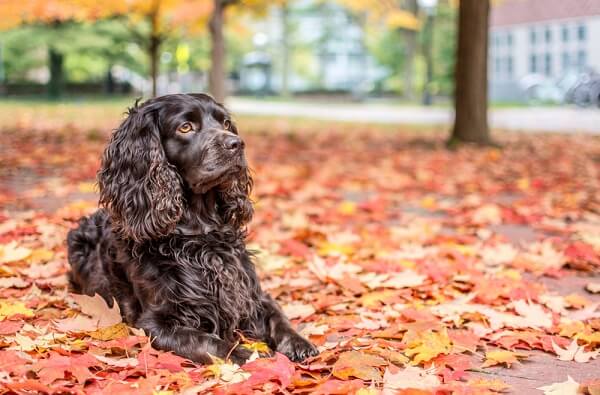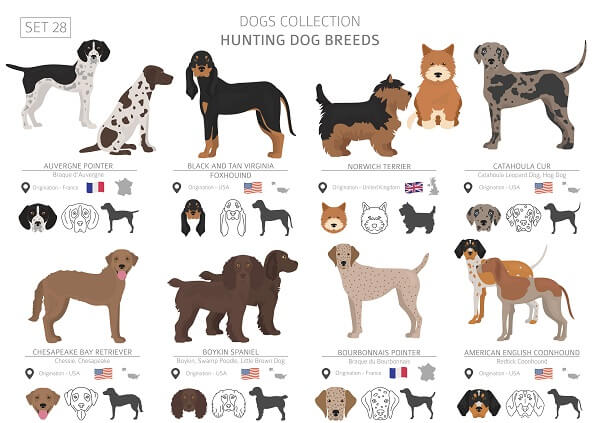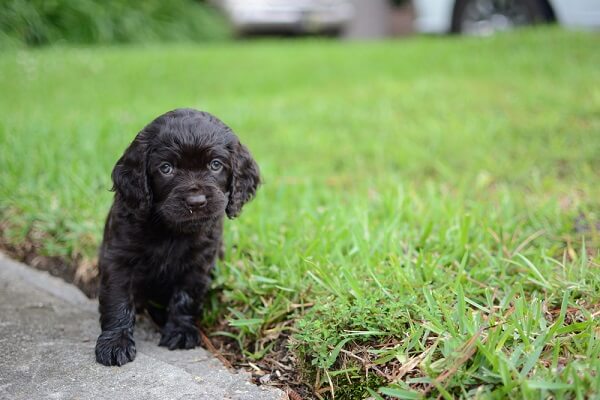
The Boykin spaniel is a breed of domestic dog that specializes as a hunting companion. Bred for their ability to flush out game animals and retrieve them, the Boykin spaniel has an excellent nose, swimming ability, and is an easy breed to train. The breed first originated in South Carolina, where it is still commonly used as a hunting dog. In fact, this breed is the State Dog of South Carolina! Boykin spaniels are typically brown with a curly coat. They are a mix of several different spaniel breeds including the Springer spaniel, Cocker spaniel, American Water spaniel, and the Chesapeake Bay Retriever. However, since the breed was developed in the early 1900s, genetics was not a major concern. As such, about 10% of Boykin spaniels now suffer from a fatal genetic defect that causes Exercise Induced Collapse syndrome. This condition is caused by the lack of a functional protein needed for sustained exertion. Boykin spaniels generally have a mellow and friendly disposition, and they make excellent family dogs. They can be very energetic and are easily trainable, making them perfect hunting companions. Plus, with their slightly webbed toes, Boykins make excellent water dogs! However, the species is not known for being hypoallergenic and may shed fairly regularly. Though the Boykin spaniel makes an excellent companion, it is also a great way to talk about several very important biological concepts. Let’s see how Man’s Best Friend can also help us learn some biology! Dogs are obviously human’s most familiar hunting companion. Dogs can be trained to chase, corner, and even kill certain game species. Others, like the Boykin spaniel, make excellent retrievers. After only a little training, most puppies will readily learn to fetch almost anything and can be desensitized to the noise of a gun. But, humans have also learned to work with a wide variety of other animals as hunting companions. For instance, did you know that people have trained ducks to hunt fish? In certain parts of Southeast Asia, fishermen have developed a special relationship with the ducks that follow their boats. The ducks follow the fisherman and often try to eat the fish in his net. But, the fisherman does not let the ducks have these smaller fish. Frustrated, the ducks go searching for larger fish. Larger fish are harder to swallow, and the ducks must return to the surface. When they do, the fisherman scoops them up and pulls the large fish out of their mouth. Then – to encourage the behavior – the fisherman rewards the duck with several smaller fish. This treat is enough that the ducks continue following the fisherman and continue catching large fish for him. The Boykin spaniel is incredibly smart, and complex behaviors come naturally to this species. For example, think about all the individual behaviors that a hunting dog must engage in to be successful. First, they must smell out any game animals in the area. Then, they must flush those animals out so they can be shot. After learning to ignore the gunshot, the dog must then go find the downed animal and avoid its natural instinct to eat the prey. Lastly, the dog must bring the game animal to the hunter and turn it over – a trick that some dogs never learn. In order to train a Boykin spaniel to do these tricks, it is best to teach each behavior individually. For instance, you can start with a smelling game where you teach the dog to find a certain scent. Hide several different scents under cups and reward the dog with a treat when it tips over the right cup. Then, you can move the game to a field to teach the behavior in a larger setting. As for retrieving, the same concept applies. Teach a dog to first chase a thrown toy, and reward it when the toy is returned. Most Boykin spaniels are highly food and praise motivated, so there is no need for any punishment or negativity in the training regime.
Kingdom
Animalia
Phylum
Chordata
Class
Mammalia
Order
Carnivora
Family
Canidae
Genus
Canis
Species
Canis familiaris
Niche
Domestic
Height
14-17 in (36-42 cm)
Weight
25-40 lbs (11-18 kg)
Lifespan
10-15 years
Social Structure
Domesticated
Conservation Status
Least Concern
Preferred Habitat
Domesticated
Average Litter Size
5-7 puppies
Main Prey Species
Dog Food
Predators
None
The Basics

Interesting Insights from the Boykin Spaniel!
Hunting Companions

Training Complex Behaviors

